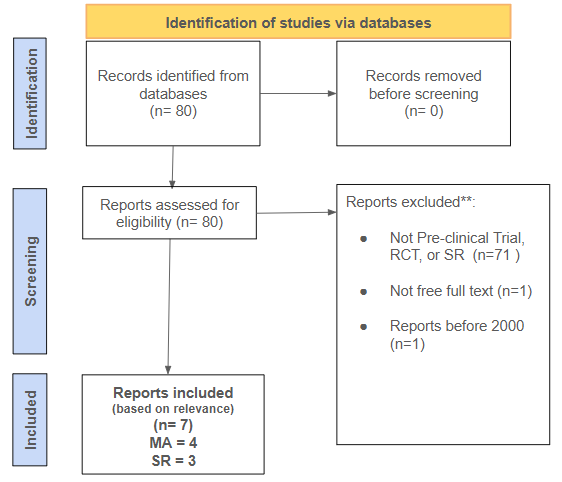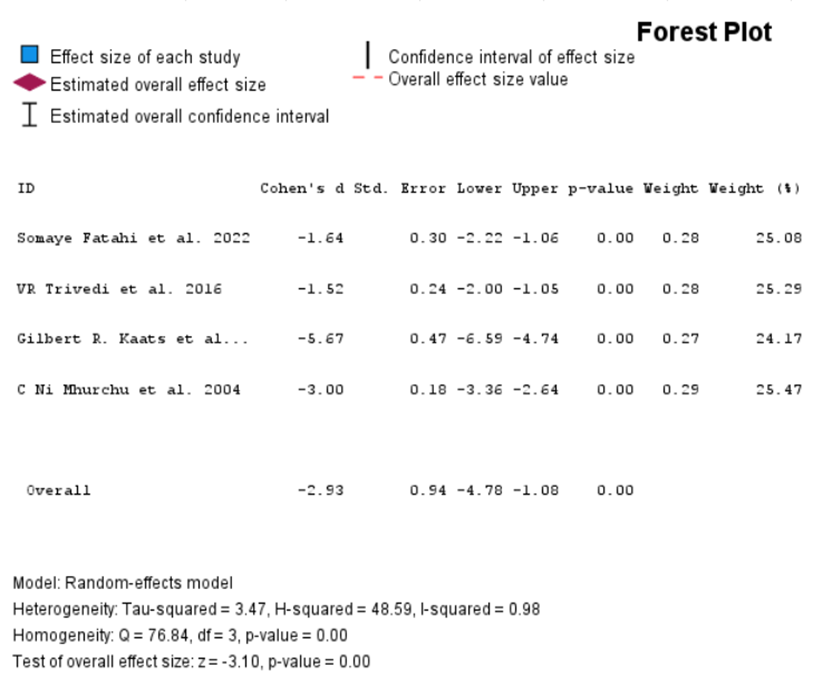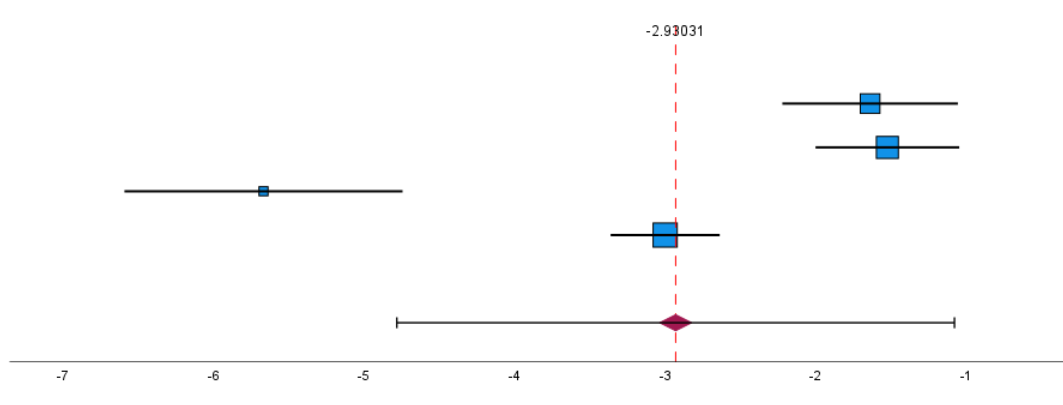Abstract
Obesity remains a major public health concern due to its association with numerous comorbidities. This meta-analysis evaluated the efficacy of chitosan supplementation in promoting weight loss among individuals with overweight or obesity. A systematic search, primarily through Google Scholar, identified four relevant randomized controlled trials comprising a total of 544 participants. Pooled analysis demonstrated a statistically significant reduction in body weight with chitosan supplementation compared to placebo (Cohen’s d = –2.93; 95% CI, –4.78 to –1.08; I² = 98%; P < .001). The forest plot revealed heterogeneity in outcomes across studies. While these findings suggest potential benefits of chitosan for weight management, the high heterogeneity and limited number of studies underscore the need for larger, well-designed trials. Future research should aim to determine optimal dosing, assess long-term efficacy, and establish a comprehensive safety profile to support clinical recommendations. Keywords: Chitosan, Obesity, Weight Loss, Dietary Supplement, Meta-Analysis.
Introduction
Obesity remains a pressing global public health concern, with the United States experiencing particularly high rates of obesity and its related health complications. According to the Centers for Disease Control and Prevention (CDC), approximately 42.4% of U.S. adults were classified as obese in 2017-2018, with obesity rates varying significantly across demographic groups.[1] Obesity is linked to a myriad of serious health conditions, including cardiovascular diseases, type 2 diabetes, certain cancers, and respiratory issues, imposing a significant burden on healthcare systems.[2] Effective weight management involves a comprehensive approach that includes maintaining a balanced diet, engaging in regular physical activity, practicing behavior modification, and making sustainable lifestyle changes.[3]
In the realm of weight management strategies, chitosan has emerged as a notable dietary supplement. Chitosan supplements have gained significant popularity due to their potential advantages, including enhanced metabolic health, decreased likelihood of obesity-related health problems, increased quality of life, and reduced healthcare expenses associated with obesity treatment.[4] Chitosan, scientifically known as poly-(1->4)-2-amino-2-deoxy-beta-D-glucose, is a natural polysaccharide derived from chitin. Chitin is primarily found in the exoskeletons of crustaceans such as crabs, shrimp, and lobsters.[5] The mechanism by which chitosan aids in weight management is thought to be through its unique properties that enable it to bind dietary fats in the digestive system, subsequently inhibiting fat absorption.[6][7] This property makes chitosan a popular choice in weight loss regimens aiming to reduce caloric intake and promote fat excretion. In the United States market, chitosan is available in various supplement forms, including tablets, capsules, and powders.[8][9] These formulations differ in their chitosan concentration and additional ingredients, reflecting the diversity of products catering to weight management enthusiasts.[10] The objective of this article is to conduct a comprehensive analysis evaluating the efficacy of chitosan in weight management through a critical review of both pre-clinical and clinical trials.
Method
Electronic databases, including PubMed and Google Scholar, were searched for relevant randomized controlled trials (RCTs) published between 2000 and 2024. Search terms included: “chitosan,” “obesity,” “weight loss,” and “dietary supplement.” The inclusion criteria were limited to RCTs and preclinical trials evaluating the effect of chitosan supplementation on body weight among adults with overweight or obesity. Only studies published in English and with full-text availability were considered.
After screening titles and abstracts for relevance, four clinical trials met the inclusion criteria and were included in the final meta-analysis. Efforts were made to include studies using a comparable dosage of chitosan, but variations in dosing were accepted due to limited data availability. Data extraction was performed independently by two reviewers and included study characteristics, participant demographics, intervention details, and outcome measures. Statistical analysis was conducted using a random-effects model to account for potential heterogeneity. Effect size was expressed as Cohen’s d with 95% confidence intervals (CI), and heterogeneity was assessed using the I² statistic.

Figure 1: Flow Chart and Study Selection showing the number of articles identified and included in the MA.
Results and Discussion
The bioactive compounds present in chitosan offer various health benefits, such as exhibiting immunostimulatory properties and showing antioxidant effects. This review encompasses a range of studies, including human clinical trials and preclinical trials conducted on animals. In a 2012 preclinical trial evaluating the anti-obesity effects of various chitosan formulations, all chitosan-treated groups demonstrated reduced weight gain compared to rats on a high-fat diet, with water-soluble chitosan microparticles (WSC-MP) showing the most significant effect (21.13 g vs. 121.25 g weight gain). Chitosan treatments also significantly reduced epididymal and perirenal white adipose tissue, while WSC-MP uniquely lowered liver weight. Additionally, all formulations improved lipid profiles by lowering total and LDL cholesterol, with WSC-MP reducing total cholesterol to 1.64 mmol/L compared to 2.70 mmol/L in the control group. [11] Similarly, a 2022 double-blind clinical trial involving adolescents with overweight or obesity reported that 12 weeks of chitosan supplementation resulted in significant improvements in body weight, BMI, waist circumference, lipid profiles, glycemic markers, and appetite-regulating hormones compared to placebo.[12] Table 1 summarizes the weight loss benefits of chitosan based on human
trials.
Table 1: Study Designs and Outcomes of Clinical Trials and Preclinical Trials

The meta-analysis of studies on chitosan as a dietary supplement for weight loss revealed significant findings. The analysis showed a large effect size (Cohen’s d = -2.93) with substantial heterogeneity (I² = 98%). The overall effect size was statistically significant (Z = -2.93, P < .001), indicating that chitosan had a notable impact on body weight reduction. The forest plot displayed significant variability among the studies. Specifically, the studies included showed mixed results: some demonstrated considerable weight loss, while others did not find a clinically significant difference compared to a placebo. Overall, the meta-analysis suggests that chitosan supplementation may indeed have a positive effect on body weight reduction, emphasizing the potential for chitosan compounds to aid in fat loss while preserving lean body mass.


Figure 3: Forest plot (Chitosan vs. Control): a MA on Weight Loss (Random-effects model)
An earlier meta-analysis from 2019, which analyzed 15 RCTs, also found that chitosan intake was associated with reductions in body weight (Weighted Mean Difference, WMD = – 0.89 kg), BMI (WMD = – 0.39 kg/m²), and body fat percentage (WMD = –0.69%), with more pronounced effects observed in studies using higher doses over shorter durations.[18] A 2024 systematic review and meta-analysis encompassing 19 randomized controlled trials (RCTs) found that chitosan supplementation led to modest but statistically significant reductions in body weight [WMD] = –0.79 kg) and body fat percentage (WMD = –0.41%), along with a slight increase in fat-free mass (WMD = 0.20 kg). However, no significant effects were observed on body mass index (BMI) or waist circumference.[19] Although modest gastrointestinal adverse effects, such as bloating, flatulence, constipation, and nausea, have been noted, particularly at larger dosages, chitosan is typically well tolerated.[20] Some formulations (LipoSan UltraTM) were used in trials, and there were no discernible gastrointestinal changes as compared to a placebo.[20] As Chitosan is a substance produced from shellfish, it can trigger allergic responses in those who are susceptible.[21] Long-term usage may interact with several drugs and decrease the absorption of fat-soluble vitamins (A, D, E, and K).[22] Liver toxicity is rare, however, it has been noted in animal experiments employing large dosages of chitosan compounds.[23] While these findings suggest chitosan may offer modest benefits for weight management, the overall effect sizes are relatively small, and further high-quality, long-term studies are needed to establish its efficacy and safety.
Conclusion
The meta-analysis findings indicate that chitosan supplementation may play a role in body weight reduction; however, the varied results across studies necessitate caution in interpretation. Further large-scale clinical trials are required to clarify the true effects of chitosan as a dietary supplement for weight loss. Determining the optimal dosage, treatment duration, and potential side effects is essential for enhancing our understanding of chitosan’s role in weight management and refining clinical recommendations.
Conflict of interest
The authors declare no conflict of interest.
Author’s Contribution
Dr. Mamun and Dr. Cervinka contributed equally to this work by extracting data, reviewing the articles, and drafting the manuscript. Dr. Chowdury assisted with the initial literature search, manuscript review, and editing. Dr. Hossain supervised the project and provided critical revisions and final edits.
Limitations of this Study
A significant limitation of this MA is the heterogeneity (I2 > 0.8) due to variations in study size, participant demographics, diagnostic methods, duration, and dosage strength. Therefore, the validity of the results in this study may be compromised.
Acknowledgments
The authors would like to thank Dr. Tyler Sargent, PharmD, Class of 2025, Appalachian College of Pharmacy, for editing and verifying the references. The authors also acknowledge the use of ChatGPT (OpenAI) for assistance with grammar checking and rephrasing some sentences during manuscript preparation.
References
- Hales CM, M.D., Carroll MD, et al. Products – Data Briefs – Number 360 – February 2020. June 26, 2020. Accessed May 13, 2025. https://www.cdc.gov/nchs/products/databriefs/db360.htm
- Adebibe M, Coppack SW. Obesity-Associated Comorbidities: Health Consequences. In: Agrawal S, ed. Obesity, Bariatric and Metabolic Surgery: A Comprehensive Guide. Springer International Publishing; 2020:1-16. doi:10.1007/978-3-030-54064-7_4-1
- External Resources. Healthy Weight and Growth. February 14, 2024. Accessed May 13, 2025. https://www.cdc.gov/healthy-weight-growth/resources/index.html
- Fatahi S, Sayyari AA, Salehi M, et al. The effects of chitosan supplementation on anthropometric indicators of obesity, lipid and glycemic profiles, and appetite-regulated hormones in adolescents with overweight or obesity: a randomized, double-blind clinical trial. BMC Pediatr. 2022;22(1):527. doi:10.1186/s12887-022-03590-x
- Elieh-Ali-Komi D, Hamblin MR. Chitin and Chitosan: Production and Application of Versatile Biomedical Nanomaterials. Int J Adv Res. 2016;4(3):411-427.
- Koide SS. Chitin-chitosan: Properties, benefits and risks. Nutr Res. 1998;18(6):1091-1101. doi:10.1016/S0271-5317(98)00091-8
- Kanauchi O, Deuchi K, Imasato Y, Shizukuishi M, Kobayashi E. Mechanism for the inhibition of fat digestion by chitosan and for the synergistic effect of ascorbate. Biosci Biotechnol Biochem. 1995;59(5):786-790. doi:10.1271/bbb.59.786
- Chitosan Supplements | Chitosan Powder. Accessed May 14, 2025. https://www.bulksupplements.com/
- Chitosan 1200 mg-150 Caps (Non – GMO) with Bio perine. Nusapure. Accessed May 14, 2025. https://nusapure.com/
- chitosan – Walmart.com. Accessed May 14, 2025. https://www.walmart.com/search?q=chitosan
- Zhang H liang, Zhong ,Xiao-bin, Tao ,Yi, Wu ,Si-hui, and Su Z quan. Effects of chitosan and water-soluble chitosan micro- and nanoparticles in obese rats fed a high-fat diet. Int J Nanomedicine. 2012;7:4069-4076. doi:10.2147/IJN.S33830
- Fatahi S, Sayyari AA, Salehi M, et al. The effects of chitosan supplementation on anthropometric indicators of obesity, lipid and glycemic profiles, and appetite-regulated hormones in adolescents with overweight or obesity: a randomized, double-blind clinical trial. BMC Pediatr. 2022;22:527. doi:10.1186/s12887-022-03590-x
- Zahorska-Markiewicz B, Krotkiewski M, Olszanecka-Glinianowicz M, Zurakowski A. [Effect of chitosan in complex management of obesity]. Pol Merkur Lek Organ Pol Tow Lek. 2002;13(74):129-132.
- Mhurchu CN, Poppitt SD, McGill AT, et al. The effect of the dietary supplement, Chitosan, on body weight: a randomised controlled trial in 250 overweight and obese adults. Int J Obes Relat Metab Disord J Int Assoc Study Obes. 2004;28(9):1149-1156. doi:10.1038/sj.ijo.0802693
- Kaats GR, Michalek JE, Preuss HG. Evaluating efficacy of a chitosan product using a double-blinded, placebo-controlled protocol. J Am Coll Nutr. 2006;25(5):389-394. doi:10.1080/07315724.2006.10719550
- Trivedi V, Satia M, Deschamps A, et al. Single-blind, placebo controlled randomised clinical study of chitosan for body weight reduction. Nutr J. 2016;15(1):3. doi:10.1186/s12937-016-0122-8
- Fatahi S, Sayyari AA, Salehi M, et al. The effects of chitosan supplementation on anthropometric indicators of obesity, lipid and glycemic profiles, and appetite-regulated hormones in adolescents with overweight or obesity: a randomized, double-blind clinical trial. BMC Pediatr. 2022;22(1):527. doi:10.1186/s12887-022-03590-x
- Huang H, Liao D, Zou Y, Chi H. The effects of chitosan supplementation on body weight and body composition: a systematic review and meta-analysis of randomized controlled trials. Crit Rev Food Sci Nutr. 2020;60(11):1815-1825. doi:10.1080/10408398.2019.1602822
- Kholdebarin M, Pahlavani N, Nikbaf-Shandiz M, et al. A Systematic Review and Meta-Analysis to Evaluate the Effects of Chitosan on Obesity Indicators. Food Sci Nutr. 2024;12(12):10030-10048. doi:10.1002/fsn3.4596
- Schiller RN, Barrager E, Schauss AG, Nichols EJ. A randomized, double-blind, placebo-controlled study examining the effects of a rapidly soluble chitosan dietary supplement on weight loss and body composition in overweight and mildly obese individuals. JANA. 2001;4(1):42-48.
- Office of Dietary Supplements – Dietary Supplements for Weight Loss. Accessed May 14, 2025. https://ods.od.nih.gov/factsheets/WeightLoss-HealthProfessional/
- What Is Chitosan? Uses, Benefits, Side Effects, and Dosage. Healthline. September 7, 2021. Accessed May 14, 2025. https://www.healthline.com/nutrition/chitosan-supplements
- Shagdarova B, Konovalova M, Varlamov V, Svirshchevskaya E. Anti-Obesity Effects of Chitosan and Its Derivatives. Polymers. 2023;15(19):3967. doi:10.3390/polym15193967
Exploring the Efficacy of Chitosan in Weight Management: A Comprehensive Review of Clinical and Pre-clinical Trials © 2025 by Abdulla Mamun, Savanah Cervinka, Shoshi Chowdhury, Mohammad Faisal Hossain is licensed under Attribution 4.0 International
Note
Place of Publication: PSciP Publishing LLC, Oakwood, VA, USA.